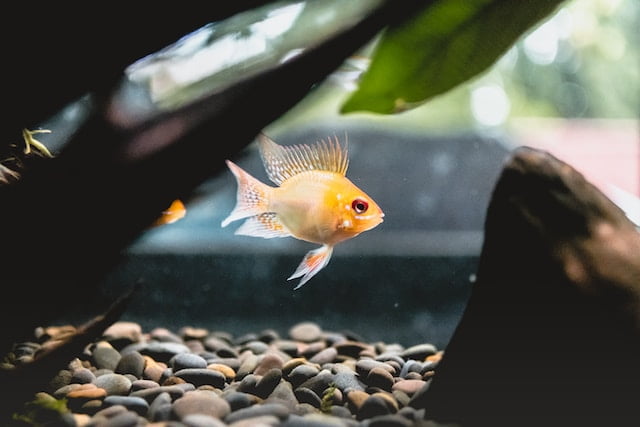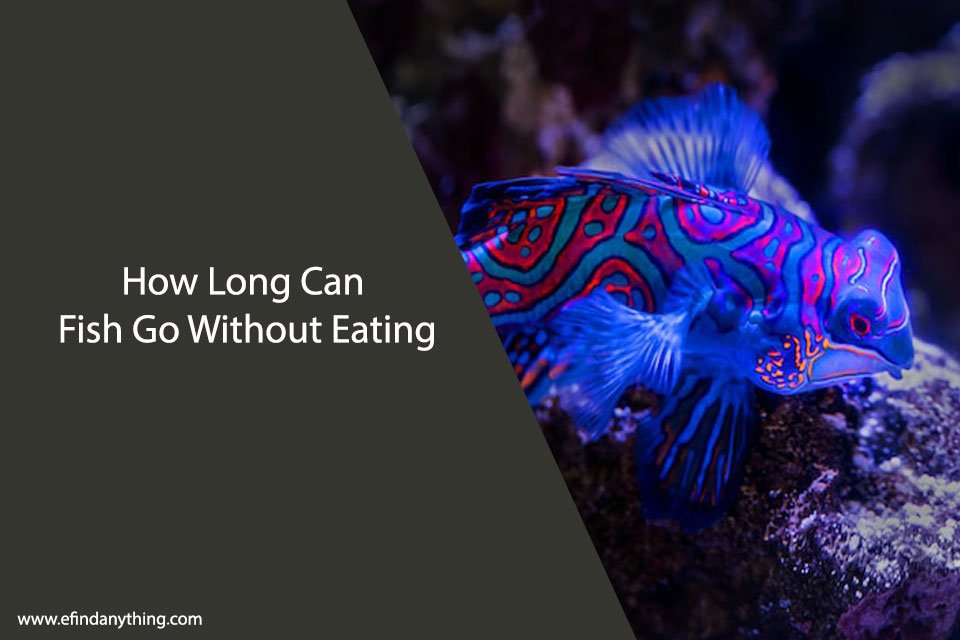Fish are fascinating creatures that inhabit a wide range of aquatic environments, from shallow freshwater ponds to deep-sea trenches. One of the most important aspects of fish biology is their ability to survive in challenging conditions, including periods of food scarcity. But how long can fish go without eating? In this article, we will explore this question and provide some insights into the factors that influence the length of time that fish can survive without food.
The duration that fish can go without food depends on several factors, including the species of fish, its age, size, and general health, as well as the environmental conditions in which it lives. Generally, larger fish can survive for longer periods without food than smaller fish, while young and sickly fish may not be able to survive for more than a few days without food. Additionally, the availability of other resources, such as oxygen and shelter, can impact the length of time that fish can go without eating. In the following sections, we will explore these factors in more detail and provide some examples of how different fish species cope with food scarcity.

Table of Contents
Understanding Fish Physiology
Metabolism of Fish
Fish metabolism is a complex process that determines how much energy they need to survive. Metabolism is the sum of all chemical reactions that occur in the body to maintain life. Fish need energy to swim, breathe, maintain body temperature, and perform other vital functions.
The metabolism of fish is affected by various factors such as water temperature, oxygen availability, and food availability. Coldwater fish have a slower metabolism than warm water fish, which means they require less energy to survive.
Fish metabolism is also affected by the size and age of the fish. Younger fish have a faster metabolism than older fish, which means they need to eat more frequently. Larger fish have a slower metabolism than smaller fish, which means they can go longer without eating.
Adaptation Mechanisms
Fish have evolved several adaptation mechanisms to survive periods of food scarcity. Some fish species can store energy reserves in their liver, muscles, and other tissues. These energy reserves can be used to sustain the fish during periods of food scarcity.
Other fish species have the ability to slow down their metabolism during periods of food scarcity. This allows them to conserve energy and survive for longer periods without eating. Some fish species can also switch to a different diet when their primary food source becomes scarce.
Fish can also adjust their feeding behavior to cope with periods of food scarcity. Some fish species become more aggressive in their feeding behavior, while others become more selective in the type of food they eat.
Overall, fish have a remarkable ability to adapt to changing environmental conditions, including periods of food scarcity. Understanding fish physiology and adaptation mechanisms can help us better understand how to manage fish populations and ensure their survival.

Factors Affecting Fish Hunger
There are several factors that can affect how long a fish can go without eating. In this section, we will discuss two major factors that have a significant impact on fish hunger: temperature influence and fish species variation.
Temperature Influence
Temperature plays a crucial role in fish metabolism and their feeding behavior. Fish are cold-blooded animals, which means their body temperature is regulated by the surrounding environment. As the temperature drops, the fish’s metabolism slows down, and they require less food to sustain themselves. On the other hand, as the temperature rises, their metabolism increases, and they need more food to maintain their energy levels.
In general, fish can go longer without food in colder water than in warmer water. For example, a cold-water fish like a trout can survive for several weeks without food, while a warm-water fish like a bass may only last a few days without eating. However, it’s important to note that this is a generalization, and each species of fish has its own unique feeding requirements.
Fish Species Variation
Different species of fish have varying feeding requirements and metabolic rates, which can affect how long they can go without eating. Some fish, like catfish, are opportunistic feeders and can survive for extended periods without food. Other fish, like salmon, have a high metabolic rate and require frequent feeding to maintain their energy levels.
Additionally, the size of the fish can also impact how long they can go without eating. Larger fish have more fat reserves, which can sustain them for longer periods without food. Smaller fish, on the other hand, have a higher metabolic rate and require more frequent feeding.
In conclusion, several factors can impact how long a fish can go without eating, including temperature, species variation, and size. It’s essential to understand these factors to ensure that your fish are healthy and well-fed.
Effects of Starvation on Fish
Physical Changes
When fish are starved, they can experience a variety of physical changes. One of the most noticeable changes is a decrease in body weight and overall size. This is because the fish’s body is using its own stored energy reserves to survive. In addition, the fish’s muscles can begin to atrophy, which can lead to a decrease in swimming ability and overall strength.
Fish may also experience changes in their internal organs. For example, the liver and digestive tract may decrease in size as the fish’s body attempts to conserve energy. Additionally, the fish’s immune system may become weakened, making it more susceptible to disease and infection.
Behavioral Changes
In addition to physical changes, fish may also exhibit behavioral changes when they are starved. One common behavior is a decrease in activity levels. This is because the fish’s body is conserving energy and reducing the amount of movement it needs to make in order to find food.
Fish may also become more aggressive towards each other as competition for limited resources increases. In some cases, fish may even resort to cannibalism, eating other members of their own species in order to survive.
It is important to note that the effects of starvation on fish can vary depending on the species, age, and overall health of the fish. While some fish may be able to survive for extended periods of time without food, others may experience significant negative impacts after just a few days of starvation.
Feeding Guidelines for Fish Owners
As responsible fish owners, it is important to ensure that our aquatic pets receive proper nutrition. Here are some feeding guidelines to keep in mind:
Ideal Feeding Frequency
The frequency of feeding your fish depends on their species and size. In general, it is recommended to feed your fish once or twice a day. However, some fish may require more frequent feedings, while others can go longer periods without food.
To determine the ideal feeding frequency for your fish, research their specific dietary needs and consult with a veterinarian or experienced fish keeper.
Overfeeding Risks
Overfeeding your fish can lead to a number of health problems, including obesity, constipation, and poor water quality. Uneaten food can also contribute to an increase in ammonia levels, which can be harmful to your fish.
To avoid overfeeding, only provide your fish with the amount of food they can consume in a few minutes. Remove any uneaten food from the tank promptly.
It is also important to vary your fish’s diet and provide them with a balanced mix of proteins, carbohydrates, and fats. This can be achieved through a combination of commercial fish food, live or frozen foods, and fresh vegetables.
By following these feeding guidelines, we can ensure that our fish remain healthy and happy.

Conclusion
Based on our research, we have found that fish can survive for varying lengths of time without food depending on the species and environmental conditions.
Some species, such as goldfish and koi, can survive for up to two weeks without food. However, it is important to note that this is not ideal for their health and well-being.
Other fish, such as bettas and guppies, can survive for shorter periods of time without food, typically around five days.
It is crucial to provide fish with a balanced and consistent diet to ensure their optimal health. Overfeeding and underfeeding can both lead to health problems and even death.
In addition to providing the right amount of food, it is also important to consider the quality of the food. High-quality fish food that is appropriate for the species can help maintain their health and prevent diseases.
Overall, while fish can survive for a period of time without food, it is important to provide them with a proper and consistent diet to ensure their health and well-being.
Frequently Asked Questions
What is the maximum time a fish can survive without eating?
The maximum time a fish can survive without eating depends on various factors such as the species of fish, age, health, and environmental conditions. Generally, most fish can survive for a few days to a few weeks without food.
Can fish survive for a week without eating?
Yes, some fish can survive for a week without eating, especially if they are healthy and have access to clean water. However, it is not recommended to leave fish without food for more than a few days as it can affect their health and wellbeing.
How many days can fish go without food?
Most fish can go without food for 3-5 days without any adverse effects. However, some species of fish such as goldfish and koi can survive for up to 2 weeks without food.
What are some tips for feeding fish while on vacation?
If you are planning to go on vacation, it is essential to ensure that your fish are well-fed before you leave. You can also use automatic feeders that dispense food at regular intervals. Additionally, you can ask a friend or neighbor to feed your fish while you are away.
Do vacation fish feeders actually work?
Yes, vacation fish feeders can work, but it is essential to choose the right type of feeder and ensure that it is set up correctly. It is also important to test the feeder before leaving to ensure that it is dispensing the right amount of food.
What types of fish can go the longest without food?
Some types of fish such as catfish, eels, and some species of carp can survive for extended periods without food. However, it is not recommended to leave any fish without food for more than a few days as it can affect their health and wellbeing.





